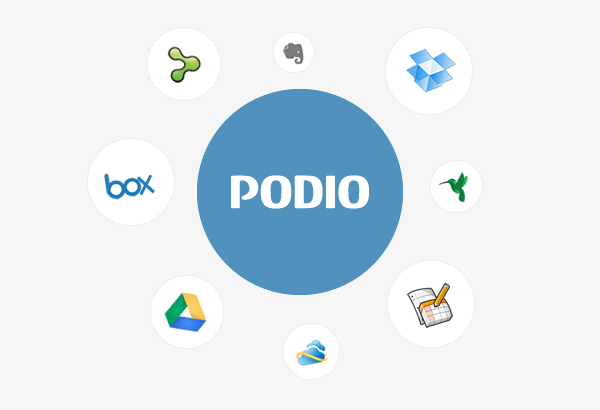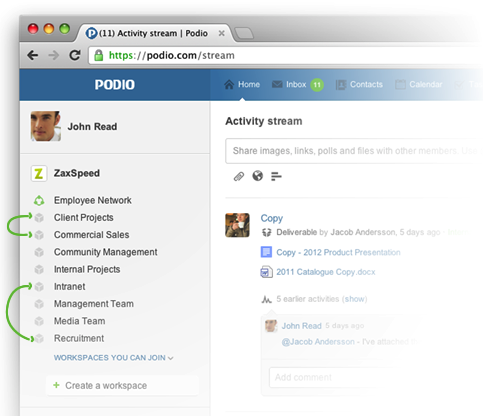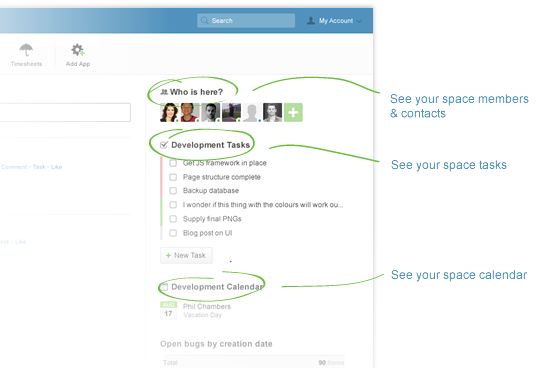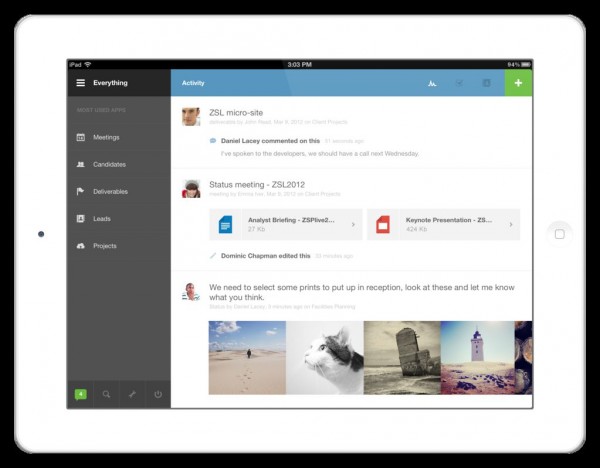Podio puts a refreshing twist into the 'online workspace' arena [review]

At face value, Podio is a very tough product to describe. Parent company, Citrix, describes it as an "online work platform", which tends to be fairly accurate, but is a definite understatement. Podio has the social likeness of Google+ or Facebook, but don't think Yammer here (Podio politely offers sociability -- it doesn't force it down your throat.) Podio leverages a powerful cloud-based CRM platform that is highly customizable, a la Salesforce. Yet it also happens to integrate useful tabular functionality and spreadsheet importing/exporting to and from Excel. So what the heck exactly is Podio?
After one month of living personally and professionally on Podio, one thing I can say is I know what it isn't. It's not a platform for those looking for a simple cookie cutter solution to a single problem. The product is targeted towards companies small and large willing to invest a little time to get a lot in return. That return, more specifically, is functionality and flexibility. Podio tosses out the "800 pound gorilla" approach to software and instead offers a different perspective: you build it, and they will come.
The Basic Premise of Podio: Divide and Conquer your Data
I have to say that I really like the two-step approach that Podio takes to managing dynamic sets of work data. Not only because it happens to make sense once you get the hang of it, but it affords a nice way to comingle your work and personal life in a close-but-still-separate way. For the record, I've moved all lead and project management for my computer repair company FireLogic to the platform, along with my entire digital task/note list that used to be housed in Evernote.
Don't get me wrong here. Evernote is a great product for what it's worth. As a general dumping ground for a wealth of information, it's a great tool. But where Podio and Evernote take different paths is information organization. Podio takes a queue from the welcome change that Google+ introduced back in 2011, which is dividing data visibility based on the way we work.
How does Podio handle this task? Through a novel approach simply called workspaces. These "data corrals" present you with an easy way to have a centralized place to collaborate with, for example, customers on a given project. Workspaces act as a standalone entity within your Podio account at large, and all data shared within them become walled off from every other workspace you have.
For example, on my company's Podio, we have an Employee Network that is limited to internal communications between employees. I then created a workspace for our common company leads and another for outstanding projects. Lastly, I have three personal workspaces organizing my blogging ideas, content for my new ebook, and a final one for personal shopping lists.
Workspaces in Podio are your best friend. Divide your data based around the groups of people you work with or by purpose.

Workspaces in Podio are your best friend. Divide your data based around the groups of people you work with or by purpose.
Everyone has Apps, including Podio
Having separate workspaces is a great tool, but they are useless without apps. This is where the flexibility of Podio really shines. For each workspace you develop in Podio there is the ability to install a near limitless number of apps that get embedded into the respective workspace you choose. Just like Apple and Google's app markets, the results for apps are a mixed bag. Some work great; some not so great. There are plenty of alternatives for each app, so it's not like you're SOL if one app is not up to your liking. Unlike apps from the Apple App Store or Google Play, however, Podio apps can all be customized to your exact liking.
Think of Podio apps like pre-built sets of Legos. If you like what it's in the stock package, go ahead and use it. If not, customize to your heart's content. For example, we started using one of the default Podio first-party project management apps to handle staying on top of our outstanding work. It was lacking in its ability to present at-a-glance information for a particular detail, so I went in and edited the app with an additional line item and removed some fluff fields we didn't need. Now, the app performs exactly the way we want it to. And since Podio is a cloud-based platform, the changes are saved server-side and become instantly available to all users in a shared workspace as they happen.
All members of a workspace that have rights to install apps can customize them, so everyone in essence can be a mini-administrator if warranted. Some companies may find comfort in this, and realize that these settings can all be fine-tuned to any particular security needs. For the most part, the app market on Podio is a refreshing way to organize, visualize and share information with internal workers or external parties. For those who love to tinker and tweak their products to the maximum extent, this is a dream come true.
If you truly don't like any of the baseline apps that already exist in the Podio (there are thousands), then just go ahead and use the App Builder to put one together. While Podio apps certainly leverage powerful database functions on the backend when it comes to search and organization, you don't have to know an ounce of coding to make something useful. The platform uses a full drag and drop style interface with options galore at your disposal so even beginning computer users can feel at home. Besides basic HTML, I'm pretty code-inept, so this was a great selling point for our company.
Tying into other Platforms and moving Your Data In and Out
It's pretty clear that Podio is all about choices. The development team includes so many paths for getting work done and data organized that it sometimes overwhelms me. But I don't mind the freedom because it means that everyone can work the way they see fit. Too many cloud companies develop software to do things their way and forget that there are actual users who may not see eye to eye.
To this regard, Podio includes numerous integrations with many of the common cloud file sharing platforms. My favorite is definitely the native tie-in with Google Drive, Gmail, and Calendar because that is my daily digital home of preference. I can see all of my Podio tasks on my Google Calendar, and I can create tasks for Podio directly from emails in my work account. Better yet, for projects we have outstanding, I can attach project documents from Drive directly to the actual entries in Podio and have seamless integration between the platforms for less time wasted poking around two places for common documents.
Google isn't the only third party getting the Podio treatment however. Evernote, Dropbox, SkyDrive, SugarSync, Box.net are some of the others, just to name a few. I love that Podio conforms to the way you handle your workflow; not the way developers intended you to.

Summary information for each workspace is only a glance away. See who's a member on a workspace; check your related tasks; and keep tabs on your common calendar items easily.
One of my other favorite aspects of Podio is the sheer fact that any data placed into an app can be exported to Excel, and vice-versa. This data portability is key to my wholesale acceptance of a platform that will host my company data, since I never want to be caught in a situation where I'm stuck indefinitely. This was the feeling I got from another Google Apps cloud CRM platform, Insightly. While some portions of your data on that service could be easily exported, others were just stuck with no other option besides recreating the information by hand. That's a definite pet peeve of mine, and a turn off for a given service.
Getting Social in Podio doesn't have to be Awkward
Too many companies think that dumping a socially-centered product like Yammer into a user's hands will directly lead to daily usage and subsequent sharing. While most of us eat up social media when we leave the office, intra-company social sharing is still a new concept. Bringing a Facebook clone inside company walls doesn't necessarily mean people will warm up to it, which is why I don't think Yammer will see any kind of massive user following even after it gets tied into Sharepoint.
The way Podio does social is welcoming in many respects. First off, it's not forced down your throat. If you wish not to use it (like myself) then it merely exists but doesn't bug the heck out of you. If you're the kind of user that thrives on keeping tabs on what goes on in a workspace through the activity feed, then you're free to do so. I'm at the point in my life where Facebook and Google+ are merely few-time-a-week pitstops and not daily excursions, so I'm not as enthralled with keeping on top of every single social feed item in Podio.
The social aspects of Podio do have some nicer points, however. One thing I like about the activity stream is the fact that any item which shows on the feed can be turned into a direct task. Did one of my coworkers just add a new lead into the system? Great -- I can make a quick task for someone to follow up on it in ten days. Did we just kick off a new website project? Excellent, because I make myself a task to ensure I get the proper documentation in place before we get too far in.

Even on an iPad, Podio's activity stream is easy to follow and lets you consume it as little (or much) as you wish.
The fact that you can keep a mental note of everything going on in a workspace is also reassuring to me. While I personally don't use the activity stream as a virtual watercooler for informal discussion, I happen to enjoy keeping track of all the changes going on in a given workspace. For my personal workspaces, it allows me to quickly glance and check on my latest items added or changes made.
But more importantly, for common workspaces I share with coworkers, it's a godsend. We're so busy as a company that not everything gets communicated in a timely manner. I can easily peek at an activity stream to see what my colleagues are working on and where I need to get involved, without having to breathe down everyone's back constantly.
Not Perfect, but better than the Rest
Is Podio a perfect platform? No. But compared to the other behemoths I've played with, it happens to be one of the easiest ones to pick up if you are merely going to consume and create information. Working with building workspaces and customizing apps takes a bit more patience, but the learning curve is no greater than the time you spent getting acquainted with Word or Excel for the first time.
Podio has its caveats, which I wish could be changed. For example, in order for someone to be capable of joining your internal "Employee Network" on Podio, they have to belong to your same email domain. So in my case, only colleagues who have an @firelogic.net email address are welcome here. I would have liked to be able to bring in outsiders who may not have formal company accounts but assist us frequently. Also, I happen to find that Podio has only a few truly excellent layout views for apps which you install. My favorites are Table (looks just like it sounds) and Badge (similar to Outlook Contact cards) but the others, while neat for some I guess, are not ideal for day to day usage.
These are all minor gripes which I know will be addressed down the road, but for now do provide some minor grievance. They're all things I can live with, because Podio as a whole provides me with a simple, cloud-based way of getting my work done in a manner that was until now not entirely possible.
Pricing for Podio is pretty straightforward, and affords those who wish to dabble in the platform to give it a shot without committing to anything early on. For the free service, you can have up to 5 internal coworkers and 5 external members joined into shared workspaces. If you move to the paid version, it costs $8/employee from your company, and external members have no cap and are totally free to invite.
I challenge you to toss out everything you know about cloud CRM and work management systems and give Podio a shot. Even SharePoint addicts may be pleasantly surprised about Podio, as it has a few tricks up its sleeve which Microsoft still hasn't figured out. If you're like me, you may find it to be the breath of fresh air you've been yearning for.
 Derrick Wlodarz is an IT professional who owns Park Ridge, IL (USA) based computer repair company FireLogic. He has over 7+ years of experience in the private and public technology sectors, holds numerous credentials from CompTIA and Microsoft, and is one of a handful of Google Apps Certified Trainers & Deployment Specialists in the States. He is an active member of CompTIA's Subject Matter Expert Technical Advisory Council that shapes the future of CompTIA examinations across the globe. You can reach out to him at [email protected].
Derrick Wlodarz is an IT professional who owns Park Ridge, IL (USA) based computer repair company FireLogic. He has over 7+ years of experience in the private and public technology sectors, holds numerous credentials from CompTIA and Microsoft, and is one of a handful of Google Apps Certified Trainers & Deployment Specialists in the States. He is an active member of CompTIA's Subject Matter Expert Technical Advisory Council that shapes the future of CompTIA examinations across the globe. You can reach out to him at [email protected].
